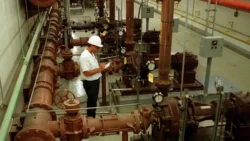
Lebanon Wastewater Treatment Plant
Lebanon Wastewater Treatment Plant: An In-Depth Analysis of Challenges and Solutions
Introduction
Wastewater management is becoming increasingly critical as urbanization accelerates and environmental concerns mount. In Lebanon, where rapid population growth and industrialization have strained existing infrastructure, wastewater treatment remains a pressing issue. The need for effective treatment plants to mitigate health risks and environmental degradation is imperative. This article provides a comprehensive overview of Lebanon’s wastewater treatment landscape, highlighting challenges, solutions, recent advancements, and future directions.
Section 1: Current State of Wastewater Management in Lebanon
Overview of the Wastewater Landscape
According to the World Bank, Lebanon produces approximately 1.1 million cubic meters of wastewater daily, with only 34% being treated adequately. This stark figure underscores the inefficiencies in current wastewater management systems. The unregulated discharge of untreated sewage into rivers and coastal areas presents a risk to public health and the environment.
Key Statistics
- Coverage Rate: The national average for wastewater treatment coverage in Lebanon is around 30%, significantly lower than the global average of 52% (UN-Water, 2020).
- Population Growth: Lebanon’s population has surged to over 6 million, further exacerbating the strain on wastewater treatment facilities, which are often outdated and underfunded.
- Health Concerns: A report by the Lebanese Ministry of Public Health states that untreated wastewater is linked to outbreaks of waterborne diseases, thus impacting public health.
Identifying Pain Points
- Inadequate Infrastructure: Much of Lebanon’s wastewater infrastructure dates back several decades and is ill-equipped to handle increased volumes.
- Lack of Investment: Limited public and private investment has hampered the development of new treatment facilities.
- Regulatory Challenges: There is often insufficient oversight on wastewater discharge standards and practices.
Section 2: Importance of Modern Wastewater Treatment Technologies
Advancements in Treatment Systems
Recent advancements in wastewater treatment technologies offer promising solutions to Lebanon’s challenges. The introduction of integrated treatment systems, such as Membrane Bioreactors (MBRs) and Advanced Oxidation Processes (AOPs), has shown considerable potential.
Advantages of Modern Technologies
- Higher Efficiency: MBRs allow for a smaller footprint while providing superior treatment quality, reducing the volume of sludge produced by 50%.
- Resource Recovery: Technologies such as anaerobic digestion can lead to biogas production, which could be harnessed for energy (Research published in the Journal of Environmental Engineering).
- Nutrient Removal: Innovations in AOPs have improved the removal of pollutants like nitrogen and phosphorus, contributing to enhanced effluent quality.
Data-Driven Insights
According to recent industry analysis, modern treatment technologies can reduce the cost of wastewater treatment by up to 20% while improving effluent quality, making investments more attractive for public authorities.
Section 3: Case Studies of Successful Treatment Initiatives
The Beqaa Valley Wastewater Treatment Plant
One of the notable successes is the Beqaa Valley Wastewater Treatment Plant, completed in 2019. This facility utilizes cutting-edge technology to treat wastewater effectively, serving a population of over 200,000 residents.
Key Performance Indicators
- Treatment Capacity: The plant has a treatment capacity of 26,000 cubic meters per day.
- Environmental Impact: Post-treatment monitoring has indicated a 90% reduction in pollutants, significantly improving local water quality.
The Tripoli Wastewater Treatment Plant
Despite challenges, Tripoli’s project, funded by the European Union, has also made significant strides. The facility incorporates a decentralized approach to treatment, ensuring that even remote communities receive adequate wastewater management.
Achievements
- Local Empowerment: Engaging local communities in the maintenance of the system has resulted in a higher degree of public ownership and care.
- Sustainable Practices: The project incorporates sustainable practices, including rainwater harvesting and energy-efficient operations.
Section 4: Addressing Key Questions on Wastewater Treatment
Q1: What are the primary contaminants present in Lebanon’s wastewater?
The most commonly found contaminants include biological, physical, and chemical pollutants, such as heavy metals, pathogens, and nutrients like nitrogen and phosphorus.
Q2: What regulatory frameworks govern wastewater treatment in Lebanon?
The Ministry of Energy and Water is primarily responsible for overseeing wastewater management, yet enforcement is inconsistent. Recent talks suggest the need for a more robust regulatory framework to ensure compliance with international standards.
Q3: How can public-private partnerships (PPPs) improve the situation?
PPPs can play a vital role by not only facilitating investment in infrastructure but also driving innovation and improving management practices. Collaborative efforts can lead to a more sustainable and effective wastewater treatment approach.
Q4: What role does community engagement play in wastewater management?
Community engagement is crucial in ensuring the sustainability of treatment facilities. When local communities are involved in the design and maintenance processes, it fosters stewardship and accountability.
Section 5: Future Directions for Wastewater Treatment in Lebanon
Implementing Integrated Water Resources Management (IWRM)
As Lebanon moves toward a more integrated approach to water resource management, the adoption of IWRM principles is essential. This strategy emphasizes the interconnectedness of water use, wastewater treatment, and environmental sustainability.
Investing in Capacity Building
Building local expertise through training and educational programs will enhance the technical capabilities of professionals involved in wastewater treatment operations. This initiative can lead to better management and more innovative solutions.
Expanding Financing Options
Mobilizing financial resources, including green bonds and international funding, will be pivotal for the expansion and maintenance of wastewater treatment infrastructure.
Conclusion
The challenges facing Lebanon’s wastewater treatment sector are substantial but not insurmountable. By adopting modern technologies, addressing regulatory gaps, and engaging local communities, Lebanon can enhance its wastewater treatment capabilities. Successfully managing wastewater will not only protect public health and the environment but will also catalyze sustainable development in the region. As we move forward, a collaborative, integrated approach is key to ensuring a cleaner, healthier Lebanon for generations to come.
In summary, Lebanon’s journey toward efficient wastewater management requires concerted efforts from all sectors. With the right investment strategies and a commitment to innovative technologies, a sustainable solution is within reach.

